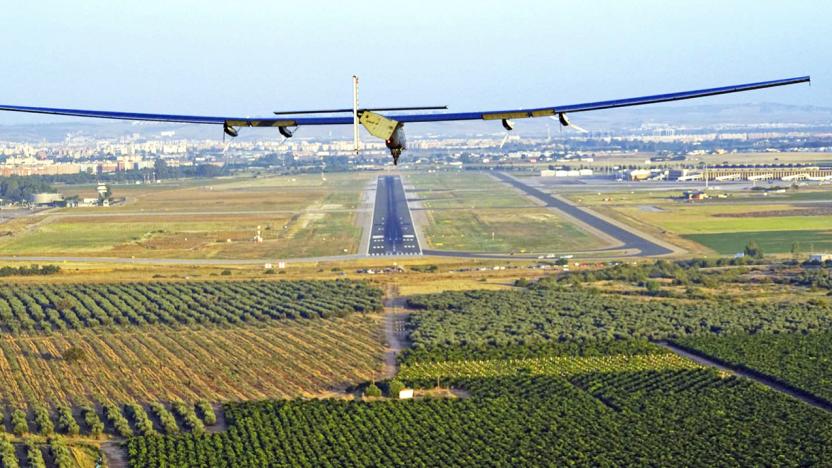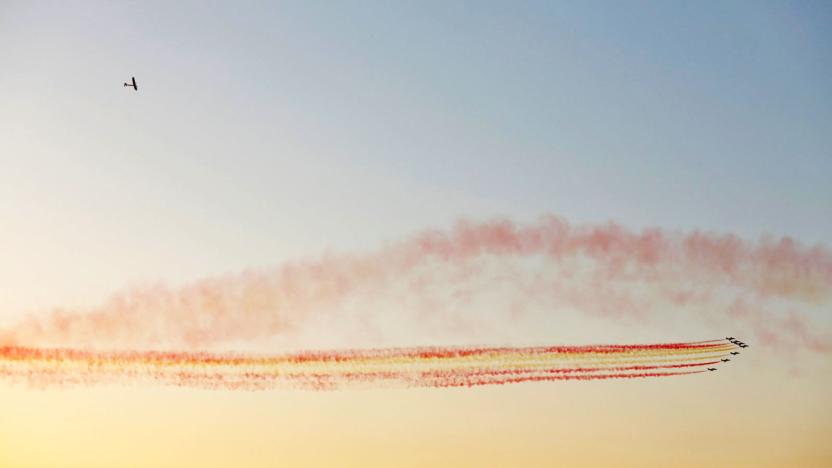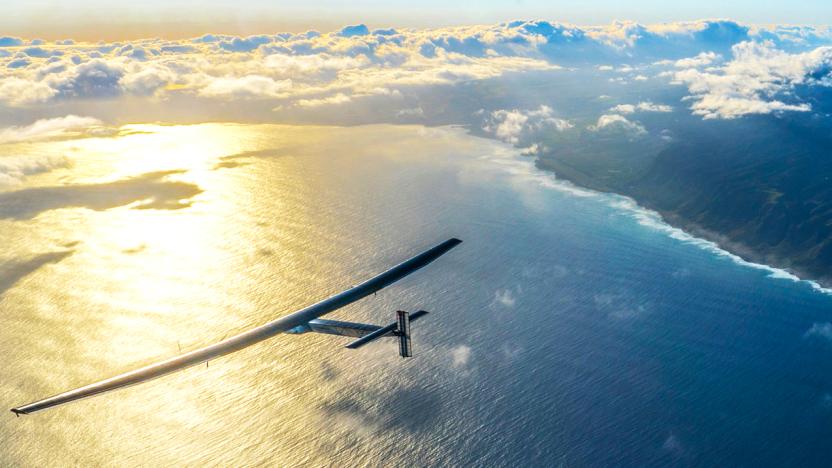solarimpulse
Latest

Solar Impulse 2 starts the last leg of its round-the-world flight
It's all coming down to this. Well over a year after beginning its round-the-world trip, Solar Impulse 2 has embarked on the final leg of its journey. The solar-powered aircraft left Cairo early on the morning of July 24th and should reach its original starting point, Abu Dhabi, within 2 to 3 days. This certainly isn't the most arduous part of the adventure (the Pacific crossing was far more challenging). However, it'll likely be the one that everybody remembers -- it'll be the definitive proof that clean energy can be used to accomplish impressive feats.

Inhabitat's Week in Green: Solar Impulse's record flight and more!
This week the Solar Impulse made history by becoming the first sun-powered airplane to cross the Atlantic Ocean. Meanwhile, a team of Swiss students built an all-electric race car that smashed an acceleration record by going from 0-60 mph in 1.5 seconds flat. Sweden rolled out one of the world's first electric highways, while two ex-Google employees are developing self-driving big rigs that slash emissions. And we showcased the Super 73 -- a bike/motorcycle hybrid that'll add some serious kick to your morning commute.

Solar Impulse makes first sun-powered Atlantic crossing
The Solar Impulse has become the first aircraft to cross the Atlantic on sun power alone. Piloted by Bertrand Piccard, it arrived in Seville, Spain this morning at 1:38AM ET, and was dramatically greeted by the nation's Patrulla Águila aerobatic formation team. The 71 hour flight, which started Monday in New York, is the second longest so far. However, it was undoubtedly the most symbolic, coming just over 89 years after Charles Lindbergh's historic "Spirit of St. Louis" Atlantic crossing.

Solar-powered aircraft completes its flight across the US
Solar Impulse 2 continues its slow creep around the globe, this time completing its journey across the US by landing in New York City. It first arrived in the continental US back in April when the solar-powered aircraft touched down in San Francisco, and now has completed its 14th leg since leaving Abu Dhabi in March of last year. It's not the fastest way to get around -- especially given delays due to battery damage -- but it is very green, which is the whole point. Next up is an Atlantic Ocean crossing, with a destination in either southern Europe or Northern Africa. Check below for video of the latest flight.

Inhabitat's Week in Green: Solar Impulse's trans-Pacific flight, and more!
The Solar Impulse airplane is on a mission to circle the globe using only the power of the sun, and this week it continued its journey by crossing the Pacific Ocean. Meanwhile, Tesla showed just how fast the Model S is by challenging a Boeing 747 to a drag race. An Italian company is turning vintage moped parts into some of the coolest electric bikes we've ever seen, and a Swedish cyclist created an all-weather bike that looks just like a car. And we've seen buses and vans turned into some pretty incredible things -- but Lee Broom's palatial gallery on wheels takes the cake.

Solar Impulse 2 completes its flight across the Pacific
After months of delays and days of flying, Solar Impulse 2 has finished crossing the Pacific. The sunlight-powered aircraft arrived in San Francisco Bay on the night of April 23rd, with an expected touchdown at Moffett Field (as of this writing) around 3AM Eastern on the 24th. This isn't the toughest stint to date (that honor goes to the 5,061-mile trip from Japan to Hawaii), but it was no mean feat. Pilot Bertrand Piccard had to travel 2,717 miles between Hawaii and San Francisco, with only short naps allowed during the 3-day expedition.

Inhabitat's Week in Green: The Tesla Model S gets an upgrade
The Tesla Model S is one of the highest-rated electric cars ever, and it just got even better. This week the automaker rolled out an upgrade that gives the vehicle a bigger battery, a refreshed exterior and a "bioweapon defense mode." Meanwhile, the Solar Impulse sun-powered airplane is getting set to fly across the Pacific Ocean after a lengthy stop in Hawaii. Stephen Hawking teamed up with Russian billionaire Yuri Milner on a plan to send postage-stamp sized spaceships to Alpha Centauri in search of life. IKEA announced plans to launch a chainless bicycle later this year, and a popular new bike/stroller hybrid hit the market only to sell out in a matter of hours.

Solar Impulse delay may end dreams of cross-Atlantic flight in 2015
It's no longer safe to say that the Solar Impulse 2 aircraft will make it around the world before 2015 draws to a close. The crew is now warning that its sun-powered machine won't fly the next leg of its journey (from Hawaii to Arizona) for at least two to three weeks due to severe heat-related battery damage. While that's not the biggest setback the team could face, it could trigger a domino effect. If SI2 doesn't get to the Eastern side of the US in time, it may miss the weather window it needs to get across the Atlantic this year. You'll find out more about the extent of the problem in the next few days, so it should soon be clear whether this is just a momentary obstacle or a serious showstopper.

Solar-powered plane completes five-day journey across the Pacific
The Solar Impulse 2 is a solar-powered plane that has been flying around the world since March. Back in May, it was set to make its most ambitious journey yet, a 5,061-mile trip from Japan to Hawaii. Unfortunately, though, Pilot Andre Borschberg's initial attempt was unexpectedly cut short (as has happened before), this time due to inclement weather. Now, several weeks later, he's finally accomplished his mission. Borschberg landed in Kapolei, Hawaii on Friday, following a five-day, 118-hour flight from Nagoya -- the longest-ever solo nonstop flight. The previous record was 76 hours.

Solar Impulse begins its sun-powered flight across the Pacific (update: bad weather)
Solar Impulse has already shown the potential for sun-based aviation in its attempt to fly around the world, but it just embarked on its most ambitious trip yet. Pilot Andre Borschberg has taken off from Nanjing, China on a cross-Pacific flight whose first leg ends in Kalaeloa, Hawaii -- 5,061 miles away. That's about 120 hours in the air, and should set records for both the longest single-seat flight ever as well as the first transpacific flight by a solar-powered aircraft. And did we mention that this leg is even more dangerous than previous parts of the journey? After a certain point, Borschberg's only choice in an emergency will be to bail over the Pacific and hope that his rescue goes smoothly.

Solar Impulse ends cross-country US flight slightly early in NY due to torn left wing
Solar Impulse has successfully hopped its way across the US, completing the final leg of its journey from Washington Dulles International Airport. While today marks the end of the effort at New York's JFK airport as expected, the solar-powered aircraft landed a roughly three hours early -- this, due to an eight-foot tear in its left wing discovered over Toms River, New Jersey. According to the crew, the breakage posed no significant threat to pilot André Borschberg, but it did mean a planned fly-by of the Statue of Liberty had to be nixed. If you'll recall, this was the first US-based trip for Solar Impulse, which the team used largely to raise further awareness about energy efficiency. Aside from that, you can bet some extra publicity can't hurt before a future model is set to make a flight across the world in 2015. Relive Solar Impulse's Across America start at Mountain View, CA here and get more info about the full endeavor at the source link. Livestream wrap-up embedded after the break.

Solar Impulse sets off on its journey across the US (video)
Early this morning at Moffet Air Field in Mountain View, California, Solar Impulse finally took off on the first leg of its barnstorming tour across the US. Of course, this isn't the first time the sun-powered plane and its pilots, Bertrand Piccard and Andre Borschberg, have flown long distance, but it is the first time it's taken wing through American airspace. Why has it come across the pond? To raise pubilc and political awareness about the benefits of going green and increasing energy efficiency -- and perhaps pick up an additional sponsor or two for its second-gen aircraft (currently in development) meant to fly around the world in 2015. "With the technologies we have onboard, we can divide by two the energy consumption of our world, and produce half of the rest [energy we need] with renewable sources" according to Piccard.%Gallery-187494% This first portion of the journey will end in Phoenix, and it'll take around twenty hours to get there, as the plane's meager output limits its average speed to around 40MPH. Should any of you want to join along with Piccard and Borschberg as they fly across the country, you can hit the Solar Impulse Across America website to see a livestream from the cockpit, along with real-time altitude, air speed and battery status of the aircraft. And, you can watch a video of Solar Impulse taking off on its North American journey and hear Borschberg talk about learning to fly it after the break.

Solar Impulse to fly across the US, pilots preparing for a trip around the world in 2015
We've been tracking the sun-powered plane known as Solar Impulse for years as it roved hither and yon. Today, Solar Impulse's pilots, Bertrand Piccard and Andre Borschberg, came to NASA's Ames research center to announce their plan to fly across America. The cross-country tour will begin in the Bay Area and end in New York, with stops in Phoenix, Dallas and Washington DC in between. Solar Impulse will also land in either Atlanta, Nashville or St. Louis, with the plane and its pilots set to stay in each locale for about a week to ten days to talk about the project before moving on. For the next month, Piccard and Borschberg will perform test flights around the Bay Area in preparation, and the plan is for the journey to start on May 1st, with an estimated arrival in Gotham sometime in early July.%Gallery-184318% The point of this new flight is to inspire and educate the public in general of the benefits of renewable energy and efficiency, and to encourage school children and university students in particular to "think off the grid" and innovate and invent on their own. To that end, the pilots will be broadcasting live transmissions and allowing the public to speak with them as they fly, in addition to providing access to flight planning information on the Solar Impulse website. Read on to learn a bit more about the Solar Impulse project and it's future plans.

Solar Impulse completes transcontinental flight, runs out of complimentary peanuts
The Impulse solar-powered plane has successfully completed its first transcontinental journey. It took 19 hours to jet between Madrid and Morocco -- with the plane's 12,000 solar cells swallowing enough power to keep it going long into the night. Pilots Bertrand Piccard and Andre Borschberg can now look forward to planning their next voyage: a round the world cruise penciled in for 2014.

Solar Impulse takes off for Morocco on first sun-powered transcontinental flight
The sun-powered Solar Impulse plane is gradually working up to a trip around the globe, with the most recent benchmark being its first international flight in 2011. Now Bertrand Piccard and Andre Borschberg are taking the jumbo jet-size plane on its first transcontinental journey. The Solar Impulse set off for Morocco today, and its pilots will stop in Madrid along the way. The goal is to complete the 1,554-mile trip by next week, and the big challenge will be crossing cloudy regions like the Pyrenees mountains separating France and Spain. In a 2010 test flight, the Impulse's 12,000 solar cells soaked up enough rays to keep the plane going through the night, but in case something goes wrong this time, the pilots are prepared with parachutes. If all goes well on this trial run, Piccard and Borschberg will be just one step away from their goal of circumnavigating the world in 2014.

Solar Impulse completes first solar-powered international flight, Captain Piccard returns to earth
We're big fans of charming, ungainly Solar Impulse, and of Captain Bertrand Piccard and Andre Borschberg's quest to circumnavigate the globe in a solar-powered plane. In case you missed the live stream: the Swiss flier just got a little closer to that goal by completing its first international flight, taking off near Berne, Switzerland and landing in Brussels, Belgium, just under 13 hours later. That's half the flight time of an earlier test, in which the craft's 200-foot wingspan, covered with 12,000 photovoltaic solar cells, kept it aloft for 26 hours. Of course, a controlled test flight is one thing -- making solar-powered flight commercially viable means proving your plane can successfully navigate busy airspace. To see Solar Impulse come in for a smooth landing, peep the video after the break.

Solar Impulse's first international flight is underway (live)
We've been following Captain Piccard's Solar Impulse solar-powered airplane for a few years now. Today, right now as a matter of fact, the pioneering Swiss HB-SIA aircraft with 200-foot wingspan is attempting its first international flight. The flight to Brussels began at 8:40am (0640GMT) and should conclude about 12 to 13 hours later when Andre Borshberg brings all 12,000 photovoltaic cells to the ground in a controlled (we hope) landing. If successful then we can expect the craft to take on the Atlantic, Lindbergh style, in 2012 or 2013. Hit the source link below to track Solar Impulse's position in real-time and to witness a live video feed of this historic event.

Inhabitat's Week in Green: Tesla's Roadster 2.5, the world's smallest electric plane, and solar jellyfish goo
Each week our friends at Inhabitat recap the week's most interesting green developments and clean tech news for us -- it's the Week in Green. From the deep blue seas to the sunny skies, this week novel renewable energy projects lit up the newswires. We watched as the world's largest wave energy site was installed in the UK, and we were excited to see Europe's largest wind farm get a major upgrade. We also took a look at several high-flying turbines that could potentially tap 870 terawatts of high-altitude wind energy, and we were shocked to see scientists develop a new type of solar cell made from bioluminescent jellyfish. We also showcased several soaring advances in green aviation as the Solar Impulse sun-powered airplane rallied for a series of trips across Switzerland and Cri-Cri, the wold's smallest electric plane, took its inaugural flight. Electric transportation also hit the streets as we took a spin in Tesla's brand new Roadster 2.5. In other news, this week we saw the light as Hulger brought their stunningly sculpted Plumen bulbs to market, and we marveled at a fresh new solar panel-inspired clothing line and a photovoltaic roofing system that doesn't look like a Blade Runner prop. Finally, we celebrated the last days of summer with this awesome solar Ibex cooker that bakes and boils using the power of the sun.

Zephyr solar powered UAV lands after a fortnight in the air (whatever that means)
With all the excitement surrounding the solar powered UAV's record-breaking flights, we would be remiss if we didn't mention that QinetiQ's Zephyr has finally landed in an airfield in Arizona, 14 days and 24 minutes after take-off. This quadruples the previous unofficial world record for unmanned flight (which it set itself in 2008). This is a dramatic proof-of-concept, having flown longer without refueling than any other airplane. We'd like to imagine that this technology would be used primarily for delivering toys to children in developing nations, but something tells us that will have to wait until the military gets its hands on it. PR after the break.

Zephyr solar UAV sets yet another flight record: 7 days and counting!
This certainly is an interesting time for solar powered flight. Solar Impulse just returned from a 26-hour manned test flight, and now QinetiQ's Zephyr, a drone who we last saw clocking over 83 hours in-flight is in the air again: this time, it's more like seven days and counting! The craft, which took off from the Army's Yuma Proving Ground in Arizona last Friday, is being billed as an "eternal aircraft," one that can stay aloft for extremely long periods of time for use as recon and communications platforms. The previous world endurance record for a UAV was set by NASA's Global Hawk, which stayed aloft for 30 hours and 24 minutes.









